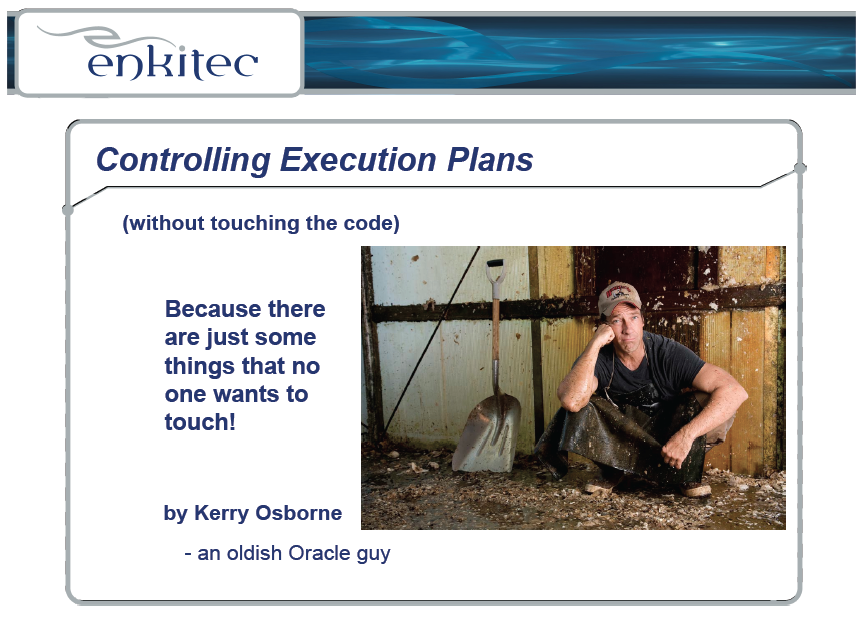I’ve mentioned (many times) that I think SQL Profiles that are generated by the SQL Tuning Advisor (STA) tend to sour over time.

After seeing it happen at a few sites I began to wonder why. So first a few facts about the SQL Profiles that STA generates:
- They are simply a set hints that get applied to statements behind the scenes during parsing
- They consist mainly of OPT_ESTIMATE hints which modify optimizer calculations
- They also may contain direct statistics modification hints (COLUMN_STATS, TABLE_STATS)
- They usually contain a OPTIMIZER_FEATURES_ENABLED hint
- They very occasionally contain other environment type hints (FIRST_ROWS, etc…)
- They do not contain directive hints (FULL, INDEX, NESTED_LOOP, etc..)
- The names of STA profiles start with SYS_SQLPROF
- STA’s goal is to do a more through job of analyzing a SQL statement to get a better plan
I wrote a little query (sql_profile_distinct_hint.sql) to pull a list of hints from a 10g database along with the number of their occurrences and ran it on several production systems where STA Profiles had been created. Here’s the output from a system that had 14 STA Profiles.
SQL> @sql_profile_distinct_hints
Enter value for profile_name: SYS_SQLPROF%
HINT COUNT(*)
-------------------------------------------------- ----------
COLUMN_STATS 13
FIRST_ROWS 1
IGNORE_OPTIM_EMBEDDED_HINTS 1
INDEX_STATS 1
OPTIMIZER_FEATURES_ENABLE 14
OPT_ESTIMATE 178
TABLE_STATS 2
Notice that the vast majority of hints are of the OPT_ESTIMATE variety. Now let’s have a look at the actual hints contained in a STA Profile.
SYS@LAB112> @sql_profile_hints
Enter value for profile_name: SYS_SQLPROF_0126f1743c7d0005
HINT
------------------------------------------------------------------------------------------------
IGNORE_OPTIM_EMBEDDED_HINTS
OPTIMIZER_FEATURES_ENABLE(default)
OPT_ESTIMATE(@"SEL$86A1760A", TABLE, "A"@"SEL$6", SCALE_ROWS=2207.090256)
OPT_ESTIMATE(@"SEL$86A1760A", TABLE, "A"@"SEL$5", SCALE_ROWS=2261.586312)
COLUMN_STATS("KSO"."SKEW", "PK_COL", scale, length=5)
COLUMN_STATS("KSO"."SKEW", "COL1", scale, length=4 distinct=828841 nulls=12.8723033 min=1 max=1000000)
TABLE_STATS("KSO"."SKEW", scale, blocks=162294 rows=35183107.66)
7 rows selected.
So on this particular STA Profile, the OPT_ESTIMATE hint has been used to tell the optimizer to change the estimate of rows for table A in query block SEL$6 by multiplying it by 2207 (roughly). In addition, there are hints which are basically hard coding table stats and column stats. So as you can see, these hints, while they may be accurate when the Profile is created, are unlikely to remain accurate over the long haul. In fairness, the OPT_ESTIMATE hint does make sense in situations where the optimizer will never get a calculation correct because of a short coming in it’s abilities (correlated columns is a good example of this type of situation). And in those conditions, implementing a STA generated Profile is a valid long term approach. But in my experience this is the exception rather than the rule.
So what are STA Profiles good for? Well two things:
First, they are very good at showing us where the optimizer is having a problem. If you look at the hints that are generated, it is easy to identify the OPT_ESTIMATE hints where the scaling factors are off the chart (hint: anything with an exponent is a place where the optimizer is struggling). This is easy to do with my sql_profile_hints.sql script by the way. Here’s a set of OPT_ESTIMATE hints. Can you spot the place where the optimizer is really having a problem?
OPT_ESTIMATE(@"SEL$5DA710D3", INDEX_FILTER, "F"@"SEL$1", IDX$$_1AA260002, SCALE_ROWS=8.883203639e-06)
OPT_ESTIMATE(@"SEL$5DA710D3", INDEX_SKIP_SCAN, "F"@"SEL$1", IDX$$_1AA260002, SCALE_ROWS=8.883203639e-06)
OPT_ESTIMATE(@"SEL$5DA710D3", JOIN, ("B"@"SEL$1", "A"@"SEL$1"), SCALE_ROWS=4.446153275)
OPT_ESTIMATE(@"SEL$5DA710D3", JOIN, ("C"@"SEL$1", "A"@"SEL$1"), SCALE_ROWS=7.884506683)
OPT_ESTIMATE(@"SEL$5DA710D3", JOIN, ("E"@"SEL$1", "A"@"SEL$1"), SCALE_ROWS=25.60960842)
OPT_ESTIMATE(@"SEL$5DA710D3", JOIN, ("F"@"SEL$1", "B"@"SEL$1"), SCALE_ROWS=26.34181566)
OPT_ESTIMATE(@"SEL$5DA710D3", JOIN, ("F"@"SEL$1", "B"@"SEL$1", "A"@"SEL$1"), SCALE_ROWS=839.9683673)
OPT_ESTIMATE(@"SEL$5DA710D3", TABLE, "D"@"SEL$1", SCALE_ROWS=5.083144561)
OPT_ESTIMATE(@"SEL$5", INDEX_SCAN, "C"@"SEL$5", ORDER_FG_ITEM_IX3, SCALE_ROWS=0.2507281101)
It’s the first two lines and whatever alias F refers to is our problem area. The OPT_ESTIMATE hint tells the optimizer to decrease it’s estimate by a factor of 8.883203639e-06. So the optimizer has vastly overestimated the rows that will be returned by the index.
Second, STA Profiles are sometimes capable of producing better plans. This is primarily due to the fact that STA can take as long as you give it to analyze a statement, making sure that all the optimizer’s calculations are correct. It does this by running various pieces of the statement and checking that the number of rows the optimizer has estimated are actually correct. Obviously this can take a while on complex statements, much longer than the optimizer is allowed when parsing a statement. But as I’ve already shown, the SQL Profiles that get created to enable those better plans have a pretty good chance of going sour on us over time.
Which leads me to the point of this post. We can have our cake and eat it too! We can create the SQL Profile as recommended by STA and then “lock” the plan into place by converting the OPT_ESTIMATE hints to directive type hints. I put the word “lock” in quotes because there is really no such thing as “locking” a plan. It’s just that using directive hints as opposed to OPT_ESTIMATE hints, significantly lowers the probability of the plan changing in the future. So how do we make this conversion. Well I have a script for that called lock_STA_profile.sql. Here’s an example showing how it works.
SYS@LAB112> @sql_profiles
Enter value for sql_text:
Enter value for name:
NAME CATEGORY STATUS SQL_TEXT FORCE
------------------------------ --------------- -------- ---------------------------------------------------------------------- -----
PROFILE_fgn6qzrvrjgnz DEFAULT DISABLED select /*+ index(a SKEW_COL1) */ avg(pk_col) from kso.skew a NO
PROFILE_8hjn3vxrykmpf DEFAULT DISABLED select /*+ invalid_hint (doda) */ avg(pk_col) from kso.skew where col1 NO
PROFILE_69k5bhm12sz98 DEFAULT DISABLED SELECT dbin.instance_number, dbin.db_name, dbin.instance_name, NO
PROFILE_8js5bhfc668rp DEFAULT DISABLED select /*+ index(a SKEW_COL2_COL1) */ avg(pk_col) from kso.skew a wher NO
PROFILE_bxd77v75nynd8 DEFAULT DISABLED select /*+ parallel (a 4) */ avg(pk_col) from kso.skew a where col1 > NO
PROFILE_7ng34ruy5awxq DEFAULT DISABLED select i.obj#,i.ts#,i.file#,i.block#,i.intcols,i.type#,i.flags,i.prope NO
PROF_6kymwy3guu5uq_1388734953 DEFAULT ENABLED select 1 YES
PROFILE_cnpx9s9na938m_MANUAL DEFAULT ENABLED select /*+ opt_param('statistics_level','all') */ * from kso.skew wher NO
PROF_79m8gs9wz3ndj_3723858078 DEFAULT ENABLED /* SQL Analyze(252,1) */ select avg(pk_col) from kso.skew NO
PROFILE_9ywuaagwscbj7_GPS DEFAULT ENABLED select avg(pk_col) from kso.skew NO
PROF_arcvrg5na75sw_3723858078 DEFAULT ENABLED select /*+ index(skew@sel$1 skew_col1) */ avg(pk_col) from kso.skew wh NO
SYS_SQLPROF_01274114fc2b0006 DEFAULT ENABLED select i.table_owner, i.table_name, i.index_name, FUNCIDX_STATUS, colu NO
SYS_SQLPROF_0127d10ffaa60000 DEFAULT ENABLED select table_owner||'.'||table_name tname , index_name, index_type, st NO
SYS_SQLPROF_01281e513ace0000 DEFAULT ENABLED SELECT TASK_LIST.TASK_ID FROM (SELECT /*+ NO_MERGE(T) ORDERED */ T.TAS NO
coe_abwg9nwg8prsj_3723858078 DEFAULT ENABLED NO
PROF_84q0zxfzn5u6s_2650913906 TEST ENABLED select avg(pk_col) from kso.skew NO
PROF_0pvj94afp6faw_FULL DEFAULT ENABLED select /* test 1 hint */ avg(pk_col) from kso.skew a where col1 = 2222 NO
PROF_875qbqc2gw2qz_4201340344 DEFAULT ENABLED select /* NOT IN */ department_name NO
PROF_09gdkwq1bs48h_167097056 DEFAULT ENABLED select /*+ index (skew skew_col3_col2_col1) */ count(*) from kso.skew NO
PROFILE_4cp821ufcwvgc_moved DEFAULT ENABLED select count(*) from kso.skew where col3 = '01-jan-10' NO
PROF_8wvgj0n4kh6dx_2650913906 DEFAULT ENABLED select avg(pk_col) from kso.skew a where col1 = 333333 NO
PROFILE_g737q1pfmbvjj_moved DEFAULT ENABLED select /*+ full (skew) */ avg(pk_col) from kso.skew where col1 = 13613 NO
PROFILE_cvdnr0b8dcxzz_MANUAL DEFAULT ENABLED select /* aasdas */ avg(pk_col) from kso.skew where col1 = 136133 NO
PROF_719syuvrm29tq_931251584 DEFAULT ENABLED SELECT IOBJID, IDOBJID, INAME, IOWNER, IOWNERID, ISPACE, ITSNO, IFILEN NO
PROF_g4gp07gt2z920_105323984 DEFAULT ENABLED update sys.scheduler$_job set last_start_date = :1, running_instance NO
25 rows selected.
SYS@LAB112> @sql_profile_hints
Enter value for profile_name: SYS_SQLPROF_01281e513ace0000
HINT
------------------------------------------------------------------------------------------------
IGNORE_OPTIM_EMBEDDED_HINTS
OPTIMIZER_FEATURES_ENABLE(default)
FIRST_ROWS(1)
OPT_ESTIMATE(@"SEL$86A1760A", TABLE, "A"@"SEL$6", SCALE_ROWS=2207.090256)
OPT_ESTIMATE(@"SEL$86A1760A", TABLE, "A"@"SEL$5", SCALE_ROWS=2261.586312)
5 rows selected.
SYS@LAB112> @find_sql
Enter value for sql_text: SELECT TASK_LIST.TASK_ID FROM (SELECT /*+ NO_MERGE(T) ORD%
Enter value for sql_id:
SQL_ID CHILD PLAN_HASH EXECS AVG_ETIME AVG_LIO SQL_TEXT
------------- ------ ---------- ----- --------- -------- --------------------------------------------------
bqfx5q2jas08u 0 2496534803 86 .00 12 SELECT TASK_LIST.TASK_ID FROM (SELECT /*+ NO_MERGE
(T) ORDERED */ T.TASK_ID FROM (SELECT * FROM DBA_A
DVISOR_TASKS ORDER BY TASK_ID DESC) T, DBA_ADVISOR
_PARAMETERS_PROJ P1, DBA_ADVISOR_PARAMETERS_PROJ P
2 WHERE T.ADVISOR_NAME='ADDM' AND T.STATUS = 'COMP
LETED' AND T.EXECUTION_START >= (SYSDATE - 1) AND
T.HOW_CREATED = 'AUTO' AND T.TASK_ID = P1.TASK_ID
AND P1.PARAMETER_NAME = 'INSTANCE' AND P1.PARAMETE
R_VALUE = SYS_CONTEXT('USERENV','INSTANCE') AND T.
TASK_ID = P2.TASK_ID AND P2.PARAMETER_NAME = 'DB_I
D' AND P2.PARAMETER_VALUE = TO_CHAR(:B1 ) ORDER BY
T.TASK_ID DESC) TASK_LIST WHERE ROWNUM = 1
1 row selected.
SYS@LAB112> @dplan
Enter value for sql_id: bqfx5q2jas08u
Enter value for child_no:
PLAN_TABLE_OUTPUT
------------------------------------------------------------------------------------------------------------------------------------------------------
SQL_ID bqfx5q2jas08u, child number 0
-------------------------------------
SELECT TASK_LIST.TASK_ID FROM (SELECT /*+ NO_MERGE(T) ORDERED */
T.TASK_ID FROM (SELECT * FROM DBA_ADVISOR_TASKS ORDER BY TASK_ID DESC)
T, DBA_ADVISOR_PARAMETERS_PROJ P1, DBA_ADVISOR_PARAMETERS_PROJ P2 WHERE
T.ADVISOR_NAME='ADDM' AND T.STATUS = 'COMPLETED' AND T.EXECUTION_START
>= (SYSDATE - 1) AND T.HOW_CREATED = 'AUTO' AND T.TASK_ID = P1.TASK_ID
AND P1.PARAMETER_NAME = 'INSTANCE' AND P1.PARAMETER_VALUE =
SYS_CONTEXT('USERENV','INSTANCE') AND T.TASK_ID = P2.TASK_ID AND
P2.PARAMETER_NAME = 'DB_ID' AND P2.PARAMETER_VALUE = TO_CHAR(:B1 )
ORDER BY T.TASK_ID DESC) TASK_LIST WHERE ROWNUM = 1
Plan hash value: 2496534803
-------------------------------------------------------------------------------------------------------------
| Id | Operation | Name | Rows | Bytes | Cost (%CPU)| Time |
-------------------------------------------------------------------------------------------------------------
| 0 | SELECT STATEMENT | | | | 9 (100)| |
|* 1 | COUNT STOPKEY | | | | | |
| 2 | VIEW | | 2 | 26 | 9 (0)| 00:00:01 |
| 3 | NESTED LOOPS | | | | | |
| 4 | NESTED LOOPS | | 2 | 240 | 9 (0)| 00:00:01 |
|* 5 | FILTER | | | | | |
| 6 | NESTED LOOPS OUTER | | 2 | 188 | 7 (0)| 00:00:01 |
| 7 | NESTED LOOPS | | 2 | 126 | 5 (0)| 00:00:01 |
|* 8 | TABLE ACCESS BY INDEX ROWID| WRI$_ADV_TASKS | 2 | 74 | 3 (0)| 00:00:01 |
| 9 | INDEX FULL SCAN DESCENDING| WRI$_ADV_TASKS_PK | 822 | | 2 (0)| 00:00:01 |
|* 10 | TABLE ACCESS BY INDEX ROWID| WRI$_ADV_PARAMETERS | 1 | 26 | 1 (0)| 00:00:01 |
|* 11 | INDEX UNIQUE SCAN | WRI$_ADV_PARAMETERS_PK | 1 | | 0 (0)| |
|* 12 | TABLE ACCESS BY INDEX ROWID | WRI$_ADV_EXECUTIONS | 1 | 31 | 1 (0)| 00:00:01 |
|* 13 | INDEX UNIQUE SCAN | WRI$_ADV_EXECS_PK | 1 | | 0 (0)| |
|* 14 | INDEX UNIQUE SCAN | WRI$_ADV_PARAMETERS_PK | 1 | | 0 (0)| |
|* 15 | TABLE ACCESS BY INDEX ROWID | WRI$_ADV_PARAMETERS | 1 | 26 | 1 (0)| 00:00:01 |
-------------------------------------------------------------------------------------------------------------
Predicate Information (identified by operation id):
---------------------------------------------------
1 - filter(ROWNUM=1)
5 - filter((DECODE(NVL("E"."STATUS","A"."STATUS"),1,'INITIAL',2,'EXECUTING',3,'COMPLETED',4,'INTER
RUPTED',5,'CANCELLED',6,'FATAL ERROR')='COMPLETED' AND
NVL("E"."EXEC_START","A"."EXEC_START")>=SYSDATE@!-1))
8 - filter(("A"."ADVISOR_NAME"='ADDM' AND "A"."HOW_CREATED"='AUTO' AND
BITAND("A"."PROPERTY",6)=4))
10 - filter("A"."VALUE"=TO_CHAR(:B1))
11 - access("A"."ID"="A"."TASK_ID" AND "A"."NAME"='DB_ID')
12 - filter("A"."ADVISOR_ID"="E"."ADVISOR_ID")
13 - access("A"."ID"="E"."TASK_ID" AND "A"."LAST_EXEC_NAME"="E"."NAME")
14 - access("A"."ID"="A"."TASK_ID" AND "A"."NAME"='INSTANCE')
15 - filter("A"."VALUE"=SYS_CONTEXT('USERENV','INSTANCE'))
Note
-----
- automatic DOP: Computed Degree of Parallelism is 1 because of parallel threshold
- SQL profile SYS_SQLPROF_01281e513ace0000 used for this statement
57 rows selected.
SYS@LAB112> @lock_STA_profile
Enter value for sql_id: bqfx5q2jas08u
Enter value for child_no (0): 0
Enter value for new_profile_name (PROF_sqlid_planhash):
Enter value for force_matching (FALSE):
PL/SQL procedure successfully completed.
SYS@LAB112> @sql_profiles
Enter value for sql_text:
Enter value for name: %bqfx5q2jas08u%
NAME CATEGORY STATUS SQL_TEXT FORCE
------------------------------ --------------- -------- ---------------------------------------------------------------------- -----
PROF_bqfx5q2jas08u_2496534803 DEFAULT ENABLED SELECT TASK_LIST.TASK_ID FROM (SELECT /*+ NO_MERGE(T) ORDERED */ T.TAS NO
SYS@LAB112> @sql_profile_hints
Enter value for profile_name: PROF_bqfx5q2jas08u_2496534803
HINT
------------------------------------------------------------------------------------------------
IGNORE_OPTIM_EMBEDDED_HINTS
OPTIMIZER_FEATURES_ENABLE('11.2.0.1')
DB_VERSION('11.2.0.1')
FIRST_ROWS(1)
NO_PARALLEL
OUTLINE_LEAF(@"SEL$86A1760A")
MERGE(@"SEL$5")
MERGE(@"SEL$532C0C35")
MERGE(@"SEL$6")
OUTLINE_LEAF(@"SEL$1")
OUTLINE(@"SEL$2")
OUTLINE(@"SEL$5")
OUTLINE(@"SEL$532C0C35")
MERGE(@"SEL$4")
OUTLINE(@"SEL$6")
OUTLINE(@"SEL$58B2FD6B")
ELIMINATE_OBY(@"SEL$3")
OUTLINE(@"SEL$4")
OUTLINE(@"SEL$3")
NO_ACCESS(@"SEL$1" "TASK_LIST"@"SEL$1")
INDEX_DESC(@"SEL$86A1760A" "A"@"SEL$4" ("WRI$_ADV_TASKS"."ID"))
INDEX_RS_ASC(@"SEL$86A1760A" "A"@"SEL$6" ("WRI$_ADV_PARAMETERS"."TASK_ID" "WRI$_ADV_PARAMETERS"."NAME"))
INDEX_RS_ASC(@"SEL$86A1760A" "E"@"SEL$4" ("WRI$_ADV_EXECUTIONS"."TASK_ID" "WRI$_ADV_EXECUTIONS"."NAME"))
INDEX(@"SEL$86A1760A" "A"@"SEL$5" ("WRI$_ADV_PARAMETERS"."TASK_ID" "WRI$_ADV_PARAMETERS"."NAME"))
LEADING(@"SEL$86A1760A" "A"@"SEL$4" "A"@"SEL$6" "E"@"SEL$4" "A"@"SEL$5")
USE_NL(@"SEL$86A1760A" "A"@"SEL$6")
USE_NL(@"SEL$86A1760A" "E"@"SEL$4")
USE_NL(@"SEL$86A1760A" "A"@"SEL$5")
NLJ_BATCHING(@"SEL$86A1760A" "A"@"SEL$5")
29 rows selected.
SYS@LAB112> @sql_profiles
Enter value for sql_text:
Enter value for name: SYS%
NAME CATEGORY STATUS SQL_TEXT FORCE
------------------------------ --------------- -------- ---------------------------------------------------------------------- -----
SYS_SQLPROF_01274114fc2b0006 DEFAULT ENABLED select i.table_owner, i.table_name, i.index_name, FUNCIDX_STATUS, colu NO
SYS_SQLPROF_0127d10ffaa60000 DEFAULT ENABLED select table_owner||'.'||table_name tname , index_name, index_type, st NO
SYS_SQLPROF_01281e513ace0000 SAVED ENABLED SELECT TASK_LIST.TASK_ID FROM (SELECT /*+ NO_MERGE(T) ORDERED */ T.TAS NO
3 rows selected.
SYS@LAB112> @sql_profile_hints
Enter value for profile_name: SYS_SQLPROF_01281e513ace0000
HINT
------------------------------------------------------------------------------------------------
IGNORE_OPTIM_EMBEDDED_HINTS
OPTIMIZER_FEATURES_ENABLE(default)
FIRST_ROWS(1)
OPT_ESTIMATE(@"SEL$86A1760A", TABLE, "A"@"SEL$6", SCALE_ROWS=2207.090256)
OPT_ESTIMATE(@"SEL$86A1760A", TABLE, "A"@"SEL$5", SCALE_ROWS=2261.586312)
5 rows selected.
SYS@LAB112>
So in this example I listed all the SQL Profiles in existence on the system (using sql_profiles.sql). Then I showed the hints associated with STA Profile, SYS_SQLPROF_01281e513ace0000 with sql_profile_hints.sql. Then I located the sql statement in v$sql using the find_sql.sql script. Then I used dbms_xplan (via the dplan.sql script) to show the plan for the statement (proving that it was using the STA Profile). Then I used the lock_STA_profile.sql script to create a directive hint based Profile in place of the OPT_ESTIMATE hint based Profile. Then I showed the hints for the new SQL Profile. Note that the original STA Profile is not dropped, but rather moved to the SAVED category, so you can still look at its hints as I have done at the end of this example.
So that’s it. This is a complex topic and I have blogged about it before on numerous occasions. You may want to look back at this post, Oracle Support Sanctions Manually Created SQL Profiles, to get a better feel for where the hints came from that are used to replace the OPT_ESTIMATE hints. By the way, Jonathan Lewis and Tom Kyte have also written about this feature. (I trust you can find them via Google)
Also, I have written a chapter on Plan Stability in the upcoming Apress book, Pro Oracle SQL. The chapter is 65 or so pages long and it covers SQL Profiles in depth, so if you are hungry for more info on this topic, I highly recommend it. 😉
You can pre-order the book here: Pro Oracle SQL (if you are so inclined)
It should be released in a few weeks.


